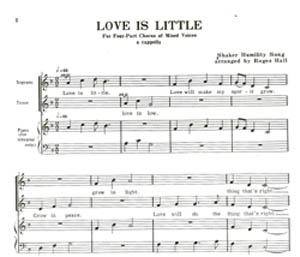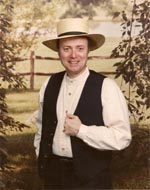

The Simplicity of Shaker Music
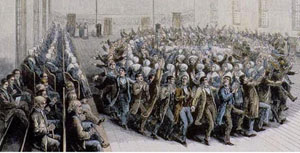
An Introduction
The music of the Shakers contains some of the most beautiful religious folk melodies from America's past.
It is also one of the oldest singing traditions in the USA.
During the 18th and 19th centuries, the Shakers had thousands of members in New York State, Massachusetts, New Hampshire, Maine, Connecticut, Kentucky, Ohio, Indiana, and later in Georgia and Florida.
For several centuries, from the 1780s to 1950s, there were well over 10,000 Shaker tunes composed -- the largest output of any religious communal society in America.
Much of their music remains unknown today to the general public and musicians, except for one Shaker song, "Simple Gifts," which was first arranged by Aaron Copland in his 1944 ballet score, "Appalachian Spring."
It is often assumed that because it is folk music, all Shaker tunes are anonymous. Not true!
Many of them can be credited to Shaker sisters or brothers, such as the humility song,"Gentle Words" by Sister Polly M. Rupe, or the quick dance song,"Come Life, Shaker Life" by Elder Issachar Bates.
Sometimes a Shaker hymn is divided between both women and men. One example is the beautiful hymn, "The Humble Heart," from the Shaker community at Harvard, Massachusetts. The words were written by Sister Eunice Wyeth and the tune by Brother Thomas Hammond from about 1820.
Unfortunately, there has been a great deal of incorrect information spread around about Shaker music by researchers who have failed to do enough research before writing their articles or books. They are seemingly unaware of the vast amount of music editions, arrangements and recordings available today.
For a list of books and articles -- click here.
The most common error is classifying all Shaker music as "songs."
That is incorrect and misleading. There are actually three broad categories of Shaker music:Songs -- one or two rhymed verses
Hymns -- two or more rhymed verses
Anthems -- prose text sometimes based on Biblical passages
It is not generally known that there were "white" (or Anglo-American) spirituals as well as "black" (or Afro-American) spirituals. Both types have a folklike, deeply emotional and sometimes frenzied connection between words and music.
Shaker tunes are examples of religious folk music, including lively dance tunes, gift songs, millennial hymns, prose anthems and other music types. They were most often sung without any instrumental accompaniment.These religious tunes are best classified together as: Shaker spirituals.
Shaker "Letteral" Music Notation
Roger Hall completed the first Master's Thesis about Shaker music notation and it was titled:
"The Shaker Letteral System: A Practical Approach to Music Notation"
(Binghamton University, 1972)It included an analysis of the first printed Shaker book with music in "letteral" music notation: A Sacred Repository of Anthems and Hymns (Canterbury, New Hampshire, 1852).
Here is an example of a Shaker hymn from that book:
Citation: "Given by inspiration, Jan. 10, 1841, Canterbury, N. H."
This hymn is the title and included on this CD, arranged by Roger Lee Hall:
Read more about the CD -- click here
Shaker Song in "Letteral" Music Notation
"Father Jame's Song" (aka: "In Yonder Valley") was composed in 1787 by Father James Whittaker at Enfield, Connecticut, one of the original Shaker leaders who emigrated from England in 1774. It is believed to be the first complete Shaker song with words and music. This early song has been recorded on the CD, "Love is Little: A Sampling of Shaker Spirituals."
Shaker letteral notation can be explained using the above example.
The pitches are the same as the letters indicate. Quarter notes have just the letter of the alphabet. Eighth notes have a single line over them (and sixteenth notes have a double line over them. Half notes have a line on the right side or on the letter itself.
Thus, the first measure has g (dotted quarter note) and a (eighth note), then g (quarter note) and e-d (two eighth notes). The next measure begins on C (half note) then D and E (quarter notes). The entire tune is in 4/4 (or Common Time) indicated by two double lines at the beginning of the tune. The dotted lines indicate the sections to be repeated. Unlike later Shaker songs, this song does not have the same number of measures in the two sections (A & B). The first or A section has 6 measures and the second B section has 12 measures. Later Shaker songs usually have 8 measures for both A and B sections.
Here is the tune transcribed and edited:
© Love is Little: A Sampling of Shaker Spirituals,
compiled and edited by Roger Hall
Rochester, NY: Sampler Records Ltd., 1996
Shaker Songs
Shaker songs were the earliest ones and originated in the 1780s. Many of the earliest songs were for dancing during the Shaker ritual.
Beginning in the early 18th century, words were included with the music. They usually had only one verse, such as "Simple Gifts." Though the form is not always the same, they are often in two strains of 8 measures and each section repeated resulting in a form of: AA + BB. The Shakers wrote songs throughout the 19th century and also, less frequently, in the 20th century.
The last known Shaker song from the 20th century was composed in 1959 by Sister Lillian Phelps at Canterbury, NH. Its is titled:"My Shaker Home." This song received its first public performance fifty years later, when performed by Roger Lee Hall at Canterbury Shaker Village in 2009, and his arrangement of this song is included on these two CDs:
Both CDs are currently available -- click here
Shaker Hymns
The first hymns were written about 1805. Their first printed hymnal, Millennial Praises, was published in 1812-13, but with texts only and no music.
One of the best known early hymns was "The Humble Heart."
This beautiful hymn is included on these CDs:
"Celestial Praises" (arrangedment by Conrad Held)
"Gentle Words" (arrangement by Roger Lee Hall)Shaker hymns originally had melody only and often had only the second strain repeated for a form of A + BB. During the 1830s, some of their hymns were harmonized in three voice parts (soprano-tenor-bass). An example of an early harmonized hymn is "Ode to Contentment," recorded on the CD, "Gentle Words."
After the 1870s, most of their hymns were in four parts (soprano-alto-tenor-bass) and many of them were printed in their published hymnals. But their "letteral" notation was still being used as late the 1880s.
There are thousands of hymns in Shaker manuscript volumes, plus thousands more in the printed Shaker hymnals.
A Checlist of Printed Shaker Hymnals is included as one of the files on this multimedia computer disc:
The Humble Heart: A Fifty Year Survey of Shaker Music
Shaker Anthems
Around 1815, anthems began to be written, similar in style to early New England anthems by William Billings, except Shaker anthems had melody only.
By the 1840s, Shaker anthems began to be harmonized in three or four voice parts as well as melody only. After 1870, most of their anthems were in four voice parts (soprano-alto-tenor-bass).
An example of an early Shaker anthem with melody only is:
"Mount Zion" (1815) by Elder Issachar BatesA later anthem in four parts (SATB) is:
"Millennial Praise" (1883) by Elder James Russell
Shaker Music On Film
A story about the early Shakers by filmmakers could make a worthwhile topic for a film, like about two prominent early Shaker church leaders: Mother Ann Lee and Father James Whittaker, who were also singers and songwriters. The story of their difficult early years in England and their triumph over persecution and prejudice, and early missionary travels through New England could make for a highly compelling dramatic film or a documentary.
If you would like to discuss this story idea or use Shaker music in a feature film or documentary,
write to Roger Lee Hall at -- Shaker music for a film
Shaker music collections
on multimedia DVDs
Read about this multimedia disc
Read about this multimedia dsic
Read about this multimedia disc
For a list of Shaker music books and articles ,
click here
Music Commissions
Would you like to commission one or more Shaker spirituals for a concert,
church service or a special event like an anniversary?Composer Roger Lee Hall has arranged many Shaker tunes over the past few decades.
He is available to edit or arrange Shaker music for solo voice or
for a chorus with or without accompaniment.
Examples of his Shaker arrangements are found here
To inquire about Shaker music for a special event or concert,
write to:
Lectures and Workshops
Are you interested in scheduling an entertaining
Shaker music program
for your school, college, church, museum or other organization?For more information about Roger Lee Hall's programs,
click on this link:
Related AMP Links
Issachar Bates and "Come Life, Shaker Life"
Joseph Brackett's "Simple Gifts"
If you have any questions or comments,
write to:
Help support the work of the
Center for American Music Preservation (CAMP)
Purchase your books, CDs or DVDs at the
© 2006-2023 PineTree Productions. All Rights Reserved for material on this website.
.





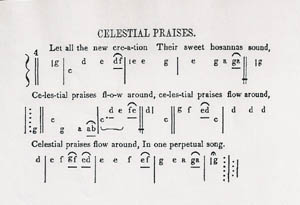
.jpg)
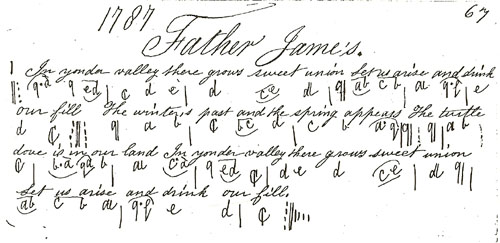
.jpg)
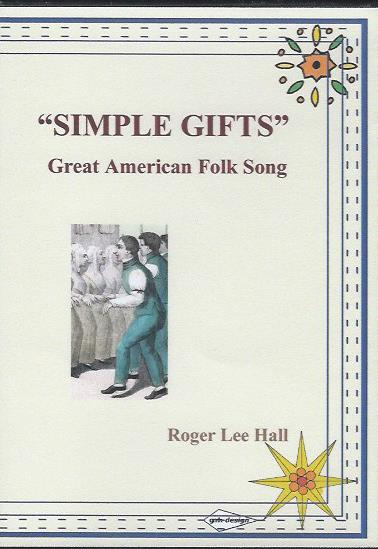
.jpg)

